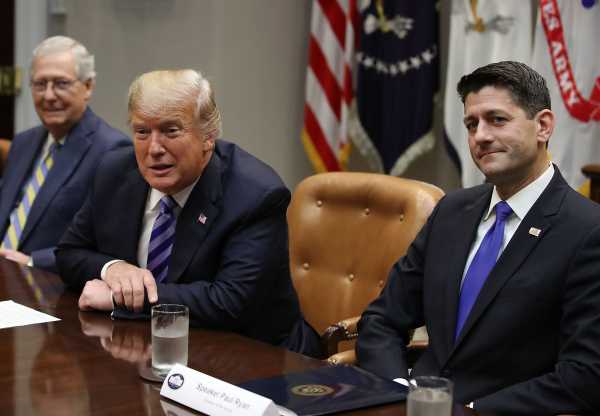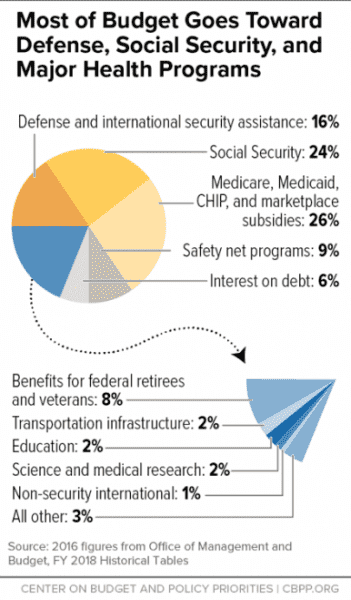
Republicans have removed all doubt: When it comes to the federal deficit, the problem is Medicare and Social Security — not their own tax cuts for corporations and the wealthy.
Fresh off the news that the deficit is increasing under President Donald Trump, Senate Majority Leader Mitch McConnell told Bloomberg News that Congress should target Social Security and Medicare for cuts to address the growing federal debt.
The federal deficit grew by nearly $800 billion over the first fiscal year of Trump’s presidency, during which the Republican Congress passed a tax cut targeted mostly to corporations and the wealthy, which is projected to add more than $1 trillion to the deficit over the next 10 years.
The White House and GOP leaders promised that despite all projections to the contrary, the tax cuts would pay for themselves. That hasn’t materialized so far.
But, of course, a growing federal deficit hasn’t caused Republican leaders to reconsider their tax policy. Instead, they argue that entitlement reform — Republican-speak for cuts to popular social safety net programs — is what’s really needed to address the federal deficit.
From McConnell’s interview with Bloomberg this week:
Republicans were actually signaling during the tax debate, before the bill ever passed, that this was their strategy: pass a deficit-exploding tax cut and then argue that the real problem is federal spending on health and retirement benefits.
It is true that those programs make up a large share of federal spending: Medicare was 15 percent of the federal budget in 2017, and it’s projected to grow to 18 percent by 2028. Social Security is a bigger chunk of the budget (24 percent in 2016), and it is on a similar trajectory. An aging population will put a strain on the program like it hasn’t seen before.

But on the other hand, Social Security benefits in particular are not exactly robust — the average check is just $1,300 a month — and we know that the program plays a big role in helping American seniors stay out of poverty. Social Security kept 27 million people out of poverty in 2017, as Vox’s Alexia Fernández Campbell reported last month.
But the GOP’s priorities on the deficit are clear: Corporate taxes were too high, and now that they’ve been cut, government benefits are too generous, so they must be cut too. The trade is explicit.
Governing is about priorities. Democrats have run on expanding Social Security benefits and extending Medicare coverage to every American. They’re proposing higher taxes on the wealthy and on corporations to pay for those plans. Republicans are going hard in the other direction: lower taxes for businesses, fewer benefits for vulnerable Americans.
However, McConnell made an important concession in his Bloomberg interview: Without bipartisan buy-in, entitlement reform is unlikely. President George W. Bush invited political backlash and electoral defeat in the 2000s when he pushed for a Social Security overhaul. In 2018, even with the deficit rising again, it seems Republicans aren’t interested in trekking out on their own on entitlement reform. The political risk may be too great.
“I think it’s pretty safe to say that entitlement changes, which is the real driver of the debt by any objective standard, may well be difficult if not impossible to achieve when you have unified government,” McConnell told Bloomberg.
But make no mistake about the long-term agenda: Now that Republicans have cut corporate taxes, they stand ready and willing to cut Medicare and Social Security.
Sourse: vox.com






